Wan Fu
I was surprised by how much cooler this guy is in Japanese.
Challenges
vs self
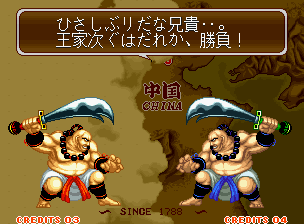
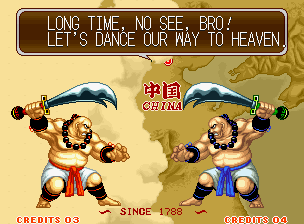
| My translation | Official translation |
|---|---|
| It's been a long time, elder brother. Let's fight to determine the royal succession, here and now! | Long time, no see, bro! Let's dance our way to heaven. |
So obviously mine would never fit into the actual game, but I wanted to show all the parts.
The word 2P Wan Fu uses for "older brother" here is a pretty rough way of doing it, and is often used for honorific older brothers, like seniors in a gang or something. But since he's talking about the royal succession, I think 1P is supposed to be his blood brother.
For the official translation, the first sentence is about as close as they could get within character limits. "Bro" is actually a decent way of handling it, it just didn't fit in with Wan Fu's whole "old-fashioned warlord" thing.
The second...I have no idea. I really don't.
vs others
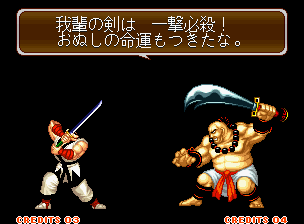

| My translation | Official translation |
|---|---|
| The world resounds with the name of the Han warlord - Wan Fu is here! | The name is Wan-Fu. King Wan-Fu. |
| To be struck with my sword is to die instantly! Thine fate is at an end. | Life is a dream, and it's morning for you. |
The first line is actually pretty good, considering character limits! It could stand to be more grandiose, but the idea is there.
Meanwhile, the second...has some problems. I suppose you can stretch a connection between "one hit and it's over" and "it's morning for you" but that's pushing it. They just made something up.
As a general note, Wan Fu speaks in a very grandiose, conquering warlord sort of style - lots of battlefield boasts, very masculine way of speaking, etc. I tried to get that across as best I could, the official translation did not.
Win Quotes
vs self
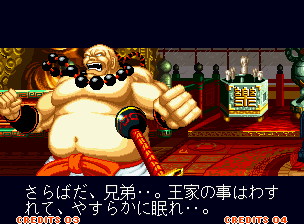
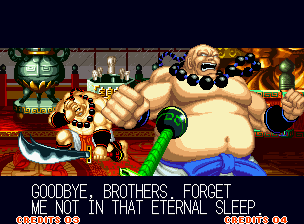
| My translation | Official translation |
|---|---|
| Farewell, brother... Forget royalty and rest peacefully... | Goodbye, brothers. Forget me not in that eternal sleep. |
I had the real bad luck to have the mirror match on the fourth stage, so I had to get the quote by losing. Oh well.
Anyway, this looks a lot more like a mistranslation than anything else. The "brothers" can be explained by lack of context, since the word usually refers to siblings but in this case it's more like not specifying if the brother is older or younger - I assume to cover the case where 2P wins. (since 2P Wan Fu is specifically 1P's younger brother, as per the challenge quote)
The second part is wrong in a weird way, since the winning Wan Fu wants the loser to forget him and all the burdens of royalty. The whole idea is that the royal succession forced them to fight and only now can the loser forget it all and rest. But the English asks the loser to not forget! Not sure how or why that happened, since this doesn't sound like the editor touched it.
Win with killing normal
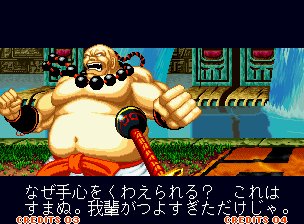
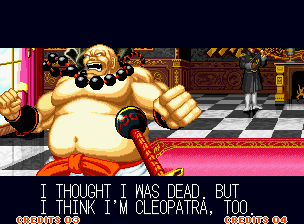
| My translation | Official translation |
|---|---|
| Why did you hold back? Forgive me for simply being too strong. | I thought I was dead. But I think I'm Cleopatra, too. |
This confused me a little, but I think I'm right. I believe the idea is that if the opponent hadn't held back, Wan Fu wouldn't have killed them, but also Wan Fu is so strong he can accidentally kill opponents. Or something like that.
Needless to say, it has nothing to do with the English line, which is pretty clearly an invention of the editor. The whole idea of people thinking they're Cleopatra (in a past life) was more popular in the 90s, and I haven't seen it for awhile. Times have changed.
Win with special move
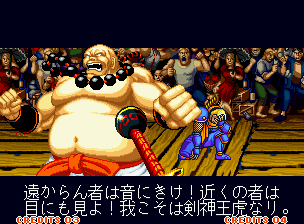
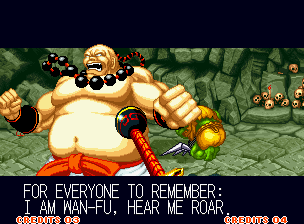
| My translation | Official translation |
|---|---|
| Those far from me, harken! Those near to me, behold! I am the god of the sword, Wan Fu! | For everyone to remember: I am Wan-Fu, hear me roar. |
Yeah, this is another one where they never would've gotten a real translation into the character limits.
So in Japanese, Wan Fu is making a classic battlefield challenge - it's got a fairly standard form in Japanese history/pop culture, and basically everyone in Japan would've recognized it for what it was. We don't really have a standardized form of those in English, but I tried to get the idea across.
"God of the sword" is another classic title for someone who is an expert in swordsmanship. Readers may have seen it in other places, it's a fairly common thing. Similar to "sword saint", etc.
The official translation tried, by falling back on good old "I am X hear me roar". We've seen that in Art of Fighting 2 and Real Bout Fatal Fury, which makes it sound more jokey than it was probably meant to be. Or it was just meant to be a joke, that works too.
Win otherwise
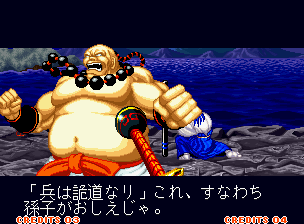
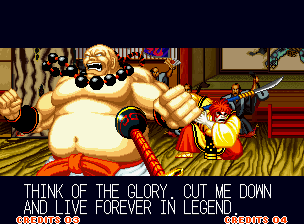
| My translation | Official translation |
|---|---|
| "All warfare is based on deception." That is the teaching of Sun Tzu. | Think of the glory. Cut me down and live forever in legend. |
I'm pretty sure I'm translating the right Sun Tzu quote here, but Chinese -> Japanese -> English can get tricky and I am neither Chinese nor sufficiently literary to look it up in the original. On the other hand, it is probably his most famous quote.
But I can see what happened here. See, the characters for the name "Sun Tzu" (孫子) are the same as the ones for "grandchildren/descendants", and it would be pretty easy to read "the teaching of Sun Tzu" as "teach your grandchildren". This is especially true for someone going fast and who didn't want to figure out what that quote was. So the translator saw something about soldiers and teaching grandchildren and made up something that sounded like it could be right, especially for a character like Wan Fu. It just happened to be wrong.
Clear

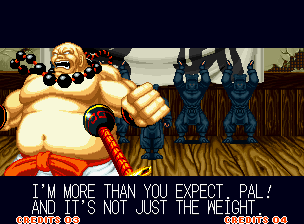
| My translation | Official translation |
|---|---|
| This is not the limit of the sword-god Wan Fu's fighting! | I'm more than you expect, pal! And it's not just the weight. |
This looks like they started with an accurate translation and then the editor got a hold of it. "More than you expect" looks like it was originally some sort of version of "this is not the limit of my fighting", just...SNKized. "It's not just the weight" is definitely the editor.
Story
Stage 4

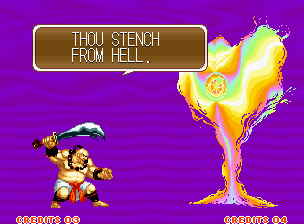
| My translation | Official translation |
|---|---|
| Wan Fu: An unworthy opponent! | Wan Fu: What a breeze. |
| Wan Fu: ! | Wan Fu: ! |
| Wan Fu: Hm? Who are you!? | Wan Fu: What |
| Amakusa: Kukuku... Behold, I am the vengeful spirit of Amakusa. Now, cry and plead unto the dark god! | Amakusa: Call me Amakusa, Amakusa! |
| Wan Fu: A...Ama....kusa? | Wan Fu: Ah..Ama..kusa? |
| Amakusa: You, one who wishes to become the ultimate conqueror-king, desire a military advisor, correct? Then, shall I lend you the power of my dark god? | Amakusa: That's right ,blubber boy. Join the dark guy and the world is your fingerbowl. |
| Wan Fu: What nonsense. I have no need of your help! | Wan Fu: Thou stench from hell. |
| Amakusa: Heheheh...then prepare yourself for death! | Amakusa: Then die,you crazy funster! |
| Wan Fu: I will not lose! | Wan Fu: Lose? Never!! |
Right off the bat we see a difference in tone, but everyone should be used to that by now. What does confuse me here is that Wan Fu uses the generally-feminine sentence ender wa here, which I suppose was much more masculine and militaristic once upon a time because I can't think of any other reason for Wan Fu to use it.
The third line feels like either a control code went wrong or someone skipped it in the editing. It sure does look silly like that, though.
I'm not sure why Wan Fu has so much trouble with Amakusa's name, but he does.
Wan Fu's entire reason for coming to Japan is cut out of the English version. He's looking for an advisor/staff officer, which is pretty necessary to run an army, even in 18th century China. He decided to find one by going around beating people up, because, uh...it's a fighting game. Anyway, Amakusa offers to give him Ambrosia's advice. This is dropped in the English version, where it's a more straightforward offer of power.
In Japanese, Wan Fu decides he doesn't need help from evil. In English...I have no idea. Just no idea at all.
The last line is especially broken in English, but it has the right idea. What confuses me is that in Japanese Wan Fu switches suddenly from 我輩/wagahai, an arrogant personal pronoun, to ワシ/washi, which is an old man pronoun. It's kind of weird. I don't know why he'd do that.
Ending
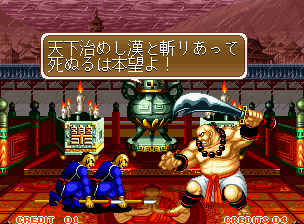
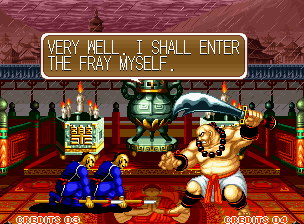
| My translation | Official translation |
|---|---|
| Wan Fu: I had heard Japan was the land of bushido and so came looking for an advisor, but in the end there was no true man in this island country... | Wan Fu: No worthy adversary was to be found in Japan. No warriors, only sushi.... |
| Underling: Lord Wan Fu! The enemy's strength is overwhelming! Our vanguard has been wiped out! | Underling: Lord Wan-Fu! The enemy's invaded in great force. Our front's breached. |
| Underling: Lord Wan Fu! The enemy army is already within ten li! | Underling: Wan-Fu! The enemy has reached jyu-ri and approaches. |
| Wan Fu: So they yearn to cross swords and die to the Han who will rule the world! | Wan Fu: Very well. I shall enter the fray myself. |
| Wan Fu: Behold the swordsmanship of Wan Fu! | Wan Fu: Come, fools! Feel my wrath! |
| The flames of battle faded in time, and now only a distant legend, inscribed in song, remains of those rival kings... | The fight was over. Few people remember Wan-Fu now. |
Kishi got Wan Fu's second line!
Here Wan Fu's reason for coming to Japan is dropped again, and replaced with a generic "trying to find a worthy opponent". "No warriors, only sushi..." also sounds like the editor got a hold of it.
A couple things to point out about the Japanese line: "no true man" could also be read as "no true Han", which would fit in with Wan Fu's whole "the Han will drive out the Manchus" thing, but it also wouldn't make much sense to go looking for a true Han in Japan. You could say "true spirit of the Han" or whatever, but it seemed a lot easier and just as likely to go with "true man".
He also ends this sentence with wa. It must've been more masculine once.
The first underling's line is fine. The second misreads "ten li" as a place name. A li was an ancient Chinese unit of measurement that's usually translated as "league", though they're not the same distance. The official, PRC-recognized li is 500m (about 0.3 miles) and the league is somewhere between 3.9 to 7.4km (2.4 to 4.6 miles). So the enemy is really, really close if they're within ten li.
What's really confusing to me is that Wan Fu's second line has a smaller text box in English. All this time I assume that there was no ability to change the size of the text boxes, leading to the brutal character limits we see, but no, this one is a different size. It's weird!
The line itself is all right, if brutally edited. It drops Wan Fu's whole Han pride thing again too.
In general, the last few lines of this are just not grandiose or poetic enough in English. A whole lot of effect is lost from the very dull translations, to the point where you kind of miss the editor. At least he spiced things up. They're not outside the bounds of accuracy, but a lot of the coolness is gone.
The last line especially is written to be poetic and wistful in Japanese and is just prosaic in English. Dull!